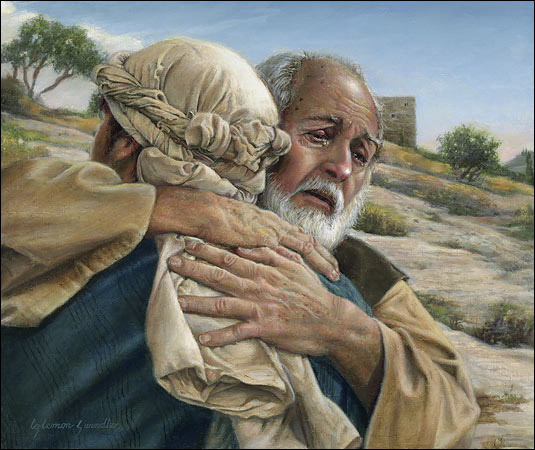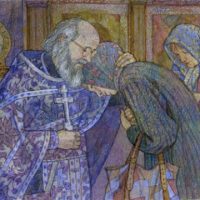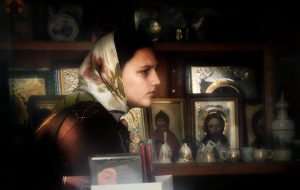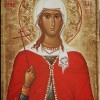Forgiveness. It seems so simple. God Himself gave us the commandment to forgive our enemies, or anyone who has simply offended us in some way. The Gospel says: If thy brother trespass against thee, rebuke him; and if he repent, forgive him. And if he trespasses against thee seven times in a day, and seven times in a day turn again to thee, saying, I repent; thou shalt forgive him (Luke 17:3-4). Even if we simply try to pray, while bearing a grudge against somebody, and start reading the Our Father, we will immediately condemn ourselves. For we ask God to forgive us in the same way that we forgive those who have offended us…
Nevertheless, any Christian would have to admit that forgiving and asking for forgiveness are exceedingly difficult things. Either language does not work, or one cannot find the right words… Perhaps at such moments, we especially need the help of the saints – the help of those who found the strength to forgive even their torturers and murderers. These people followed Christ until the end in different centuries, remembering His sacrifice and prayer for the people who crucified Him: Father, forgive them; for they know not what they do (Luke 23:34).
THE OLD TESTAMENT
The first examples of forgiveness come to as from as early as the Old Testament. Esau forgave his brother Jacob, who had taken away his primogeniture and their father’s blessing with cunning (Genesis 33:4). Joseph, who had been sold into slavery by his brethren, became Pharaoh’s confidant. His brothers were terrified, understanding that he had been given over their lives, but Joseph comforted them, saying: Fear not: for am I in the place of God? (Genesis 50:19).
Both these examples involve familial and fraternal relationships. Of course, sometimes forgiving a relative is as hard as forgiving an unknown thief or murderer, but such forgiveness is still possible for each one of us. Christianity raises this virtue to another level. Christ will require more of His disciples: to love not merely those who do one good, but also one’s real enemies.
THE NEW TESTAMENT
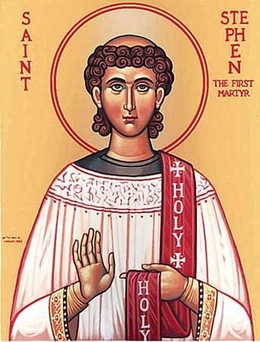 But first He will teach people to address God as Father. The story of the Prodigal Son gives us an extraordinary example of forgiveness. The father who welcomed his son with open arms is the Lord Himself, Who patiently awaits our conversion. The allegorical story of the Lord’s complete forgiveness has impressed artists, poets, and writers so much that it is still one of the most powerful images imprinted on canvases and in words.
But first He will teach people to address God as Father. The story of the Prodigal Son gives us an extraordinary example of forgiveness. The father who welcomed his son with open arms is the Lord Himself, Who patiently awaits our conversion. The allegorical story of the Lord’s complete forgiveness has impressed artists, poets, and writers so much that it is still one of the most powerful images imprinted on canvases and in words.
The first martyr of the Christian era would already follow Christ to the end before his death. The Archdeacon Stephen, who was killed by stoning, prayed for his murderers. He breathed his last with a prayer on his lips: Lord, lay not this sin to their charge (Acts 7:60).
CHRISTIAN MARTYRS
The Lives of Saints who lived centuries before us are short on detail, but convey a basic truth: the first Christians went to their death and torture, but realized that their persecutors were only tools in the hands of the forces of evil. The saints detested sin, but forgave sinners.
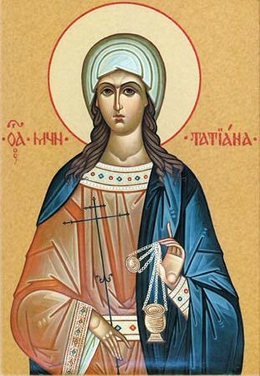 Such were the Hieromartyrs Proclus and Hilarius, who suffered during the persecution of Emperor Trajan (98-117). The torturers tried to force them to offer sacrifices to the pagan gods. After much torture, St. Proclus was brought outside the town in order to be tied to a pillar and be shot with arrows. The soldiers who carried St. Proclus tried to persuade him into submitting to them in order to save his life, but the saint replied that they should perform their duty. On the road to the place of his murder, his nephew, St. Hilarius, met them and hugged his uncle, the martyr, and also confessed himself to be a Christian. The soldiers arrested him and threw him into prison. The Holy Martyr Proclus prayed for his torturers under a hail of arrows and gave up his soul to God with prayer.
Such were the Hieromartyrs Proclus and Hilarius, who suffered during the persecution of Emperor Trajan (98-117). The torturers tried to force them to offer sacrifices to the pagan gods. After much torture, St. Proclus was brought outside the town in order to be tied to a pillar and be shot with arrows. The soldiers who carried St. Proclus tried to persuade him into submitting to them in order to save his life, but the saint replied that they should perform their duty. On the road to the place of his murder, his nephew, St. Hilarius, met them and hugged his uncle, the martyr, and also confessed himself to be a Christian. The soldiers arrested him and threw him into prison. The Holy Martyr Proclus prayed for his torturers under a hail of arrows and gave up his soul to God with prayer.
The Holy Martyr Tatiana, the Deaconness of Rome, who accepted death for her confession of Jesus Christ during the reign of Emperor Alexander Severus (222-235), bravely endured everything. When the torturers tore her eyes out, she prayed that the Lord would open their spiritual eyes.
THE SUFFERINGS OF SAINTS
The Venerable Doulas the Passion-Bearer of Egypt, the years of whose life are not known for certain, was a monk in an Egyptian monastery. Being meek, he endured mockery, abuse, and humiliation from some of the brethren for twenty years. At first it was difficult for him; but gradually, praying to God and humbling his soul, he reached the point that he was able to feel sorry for his abusers with all his heart and to pray for them.
One day a monk stole and hid some church vessels. When an investigation of the theft was carried out, the detractors of St. Doulas accused him. The humble monk tried to defend himself, but when he became convinced that nobody would believe him, he stopped arguing and said: “Forgive me, holy fathers; I am a sinner.” The abbot ordered that the venerable saint be stripped of his monastic clothing and be dressed in secular clothes. St. Doulas was chained and beaten cruelly by the steward, but he was unable to get him to confess where the church vessels had been hidden. The saint was given over for trial to the civil authorities. Later he was tortured and, according to the law, the authorities were going to cut off his hands, but the real culprit repented and went to the abbot asking that the punishment be stopped.
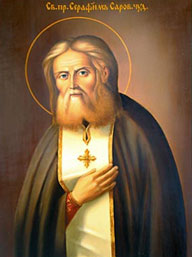 The venerable saint was brought back to the monastery. The monks began to ask the saint’s forgiveness, but he was not only not angry with them, but he even thanked them for giving him an opportunity to blot out his sins through innocent suffering. The saint asked the Lord to forgive his offenders. After three days he died, but his body disappeared from the locked cathedral. Thus, the Lord showed that those who considered the Venerable Doulas to be a sinner were unworthy of burying his body.
The venerable saint was brought back to the monastery. The monks began to ask the saint’s forgiveness, but he was not only not angry with them, but he even thanked them for giving him an opportunity to blot out his sins through innocent suffering. The saint asked the Lord to forgive his offenders. After three days he died, but his body disappeared from the locked cathedral. Thus, the Lord showed that those who considered the Venerable Doulas to be a sinner were unworthy of burying his body.
The Venerable Seraphim of Sarov, who met everyone with the words “My joy,” was once beaten and maimed by robbers so cruelly that he walked bent over for the rest of his life. But when these evil people were caught, St. Seraphim forgave them and asked the authorities not to punish them.
THE NEW MARTYRS AND CONFESSORS OF RUSSIA
It is hard to forgive a cheater or a thief. But how can you forgive someone who will take your life in a minute? Our entire being resists the thought of death. How much strength do people have who have found the ability to renounce their most valuable possession – their life – and to forgive their killers? Only saints have the strength to do so. But Rus’ has revealed such saints in abundance to the world and we, the infirm, cannot fully grasp the depth of the great struggle of the New Martyrs and Confessors of Russia. Dry protocols rarely convey to us what people condemned to death actually thought and felt at the moment. Therefore every page of a diary, every letter, every recollection are all the more valuable.
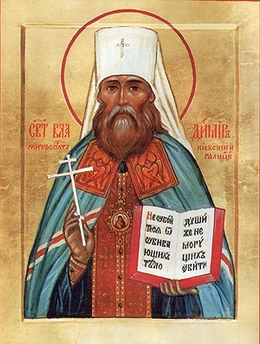 One of the first martyrs of the new era, Metropolitan Vladimir (Bogoyavlensky) of Kiev, was brutally killed in 1918. Five armed soldiers, led by a sailor, came to the Kiev-Caves Lavra, where the Metropolitan lived, on the evening on January 25, 1918. The most disturbing thing is that the saint was betrayed by his own inner circle. Monks of the Lavra, who were dissatisfied with their archpastor, and encouraged by Archbishop Alexy, started a rumor that the Metropolitan kept money from the churches in Kiev. The soldiers demanded that Vladyka Vladimir return it. They tortured Vladyka, but did not obtain any results, so they took him outside the walls of the Lavra to shoot him. Before his death, Metropolitan Vladimir blessed the murderers cross-wise with his hands, saying: “The Lord bless you and forgive you.” No sooner had he lowered his hands, than three shots killed him. These furious people hit and stabbed the motionless body with their riffle butts for a long time.
One of the first martyrs of the new era, Metropolitan Vladimir (Bogoyavlensky) of Kiev, was brutally killed in 1918. Five armed soldiers, led by a sailor, came to the Kiev-Caves Lavra, where the Metropolitan lived, on the evening on January 25, 1918. The most disturbing thing is that the saint was betrayed by his own inner circle. Monks of the Lavra, who were dissatisfied with their archpastor, and encouraged by Archbishop Alexy, started a rumor that the Metropolitan kept money from the churches in Kiev. The soldiers demanded that Vladyka Vladimir return it. They tortured Vladyka, but did not obtain any results, so they took him outside the walls of the Lavra to shoot him. Before his death, Metropolitan Vladimir blessed the murderers cross-wise with his hands, saying: “The Lord bless you and forgive you.” No sooner had he lowered his hands, than three shots killed him. These furious people hit and stabbed the motionless body with their riffle butts for a long time.
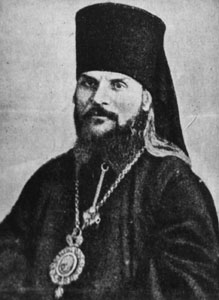 The Hieromartyr Macarius (Gnevushev), Bishop of Orel and Sevsk, and fourteen other people were taken to a deserted place near Smolensk in 1918, where they were placed with their backs to a freshly dug grave. The condemned people were shot in a row. Vladyka was the last one. All that time, he was praying with prayer rope in hand and blessed everyone, saying: “Go in peace.” When it was his turn, the Red Army soldier hesitated. Seeing fear in the executioner’s eyes, Vladyka said: “My son, may not your heart be troubled, but do the will of the one who sent you.” Soon after, this soldier, an ordinary peasant, appeared at a hospital for the mentally retarded. Every night, he saw the murdered saint blessing him. “I suppose we have killed a holy man. Otherwise how could he know that my heart sank? But he did know and he blessed me out of compassion, and now he comes to me out of compassion and blesses me to show that he is not angry. But I know that my sin cannot be forgiven. I do not like God’s world anymore. I do not deserve to live and I do not want to,” were the words of this pitiful killer.
The Hieromartyr Macarius (Gnevushev), Bishop of Orel and Sevsk, and fourteen other people were taken to a deserted place near Smolensk in 1918, where they were placed with their backs to a freshly dug grave. The condemned people were shot in a row. Vladyka was the last one. All that time, he was praying with prayer rope in hand and blessed everyone, saying: “Go in peace.” When it was his turn, the Red Army soldier hesitated. Seeing fear in the executioner’s eyes, Vladyka said: “My son, may not your heart be troubled, but do the will of the one who sent you.” Soon after, this soldier, an ordinary peasant, appeared at a hospital for the mentally retarded. Every night, he saw the murdered saint blessing him. “I suppose we have killed a holy man. Otherwise how could he know that my heart sank? But he did know and he blessed me out of compassion, and now he comes to me out of compassion and blesses me to show that he is not angry. But I know that my sin cannot be forgiven. I do not like God’s world anymore. I do not deserve to live and I do not want to,” were the words of this pitiful killer.
The Hieromartyr Michael Kargopolov, priest of the Achinsk Deanery of the Krasnoyarsk district, who was an officer of the Cossack army before his ordination, was arrested in 1919. The Red Guard brought him to a village, took him from a sledge, removed his fur coat, and demanded that he remove his cross. Fr. Michael refused to do so. The Red Army soldiers tried to wrest the cross from his hands, but in vain. Clutching his cross, Fr. Michael prayed: “They do not know what they are doing!” The executioners fired around twenty shots at him until they killed him.
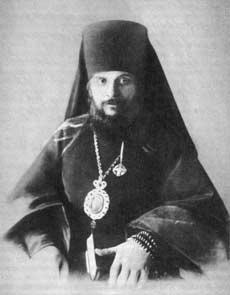 The Hieromartyr Hermogenes (Dolganev), Bishop of Tobolsk and Siberia, was drowned by the Red Guard, who threw him from a steamer deck into the Tura River. Bishop Hermogenes prayed for his torturers and blessed them, while they cynically mocked him by tying a heavy stone to his body.
The Hieromartyr Hermogenes (Dolganev), Bishop of Tobolsk and Siberia, was drowned by the Red Guard, who threw him from a steamer deck into the Tura River. Bishop Hermogenes prayed for his torturers and blessed them, while they cynically mocked him by tying a heavy stone to his body.
The Venerable Martyr, the Grand Duchess Elizabeth Feodorovna, who forgave the killers of her husband, Grand Duke Sergei Aleksandrovich, showed forth a supreme example of meekness during the last minutes of her life by praying for those who had thrown her and the other Dukes of the Romanov family into the Alapaevsk mine.
The Russian land is soaked through with the blood of martyrs, both those who have been glorified and those who are yet unknown. But the blood of clergymen continues to be shed at the present time. And words of forgiveness are pronounced with the same pain. Thus, a widow forgave her the killers of her husband, Fr. Oleg Stupichkin from the village of Neiva-Shaytansky in the Alapaevsk district of the Sverdlovsk region, who was killed on the eve of Nativity, 2007. She said: “I cannot hold anger in my heart. The ability to forgive is essential. All we can do is pray.”
Translated from the Russian by Maria Trushanina












